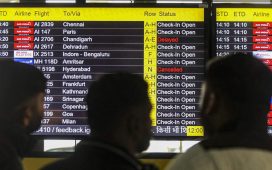Four of Britain’s oldest nuclear power plants will continue running for more than a decade longer than initially planned to help bridge a gap before the delayed Hinkley Point nuclear station starts up.
The owner of Britain’s nuclear plants, the French energy company EDF, said it had agreed to extend the lifetime of its reactors yet again to “boost energy security and reduce dependence on imported gas”.
The decision means that the Heysham 2 nuclear reactor in Lancashire and the Torness nuclear plant in East Lothian, Scotland, will keep producing low-carbon electricity for an additional two years to March 2030.
It is the second life extension for the two plants, which both started operating in 1988 and were originally expected to run for 30 years.
EDF will also extend the life of the Heysham 1 plant and the Hartlepool nuclear plant in Teesside by one extra year until March 2027. It is the fourth time EDF has extended the lifetime of these plants, which both began generating electricity in 1983 and were initially expected to close in 2008.
Ed Miliband, the energy secretary, said: “These extensions are a major win for our energy independence – powering up to 11.6m homes for longer while supporting good jobs across Lancashire, Teesside and East Lothian. We can’t achieve clean power by 2030 without nuclear, which provides an all-important steady supply of homegrown clean energy.”
“This will come alongside our backing for new nuclear including supporting the completion of Hinkley Point C, confirming £2.7bn for Sizewell C, and pressing on with contract negotiations for our small modular reactor competition,” Miliband said.
Britain has not built a new nuclear power plant since the Sizewell B reactor, on the Suffolk coast, was commissioned in 1995, meaning the UK’s nuclear output is expected to decline sharply in the years ahead as older reactors begin to close.
The delays to start up the Hinkley Point C nuclear project in Somerset, the first plant to be built in a generation, threatens to leave a gap in the UK’s supplies of low carbon power, which could lead to higher level of gas power on days when renewable energy is in short supply. EDF is also hoping to extend the life of the Sizewell B plant by 20 years longer than scheduled, until 2055.
Mark Hartley, the managing director of EDF’s nuclear operations business, said: “When EDF acquired these stations in 2009, they were all due to end generation by early 2023 which would have left the UK with just one generating nuclear station at Sizewell B.”
He said the ability to extend their lifetimes was a testament to the company’s £8bn investment in the UK’s nuclear fleet since 2009, which had helped the sites generate far higher output than was predicted. The company expects to spend another £1.3bn in its five generating stations over the next three years to keep them running safely.
The extension was revealed in the same week that UK energy generators were called on to ramp up their electricity output after the system operator warned that the country faced an energy supply crunch on Tuesday evening.
The National Energy System Operator (Neso) triggered an official warning over Britain’s power supplies just hours before an expected squeeze on the country’s electricity was forecast, but later removed the warning notice, saying it had “enough electricity generation to meet demand”.










